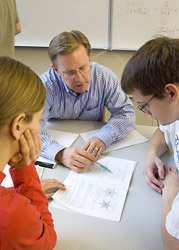Growing up in Los Angeles and studying as an undergraduate at Brigham Young University, Michael Dorff hadn’t heard a lot about Kentucky, let alone the University of Kentucky.
But while he was getting his masters in mathematics at the University of New Hampshire and trying to look for a doctoral program, one of his professors mentioned UK.
“She told me about a professor at UK, Ted Suffridge,” Dorff said. “He’s the reason I applied.”
Dorff, now an associate professor in Brigham Young University’s math department, said he wasn’t disappointed.
“The faculty at UK had high expectations that I would work hard and professors like Ted Suffridge were always looking for ways to help me and the other students,” Dorff said. “People there were very friendly, very nice. I have these fond memories of the people and the area.”
 Dorff finished his PhD in 1997 and was hired as an assistant professor at the University of Missouri-Rolla.
Dorff finished his PhD in 1997 and was hired as an assistant professor at the University of Missouri-Rolla.
In 2000, he accepted a position at Brigham Young University where he has taught classes like differential geometry, calculus and complex variables. In addition to being an associate professor, Dorff is currently the associate chair of the math department.
On top of the courses he teaches and the research he does in minimal surfaces, Dorff works to provide opportunities for undergraduate students to get involved in mathematics research.
He is the director of the Center for Undergraduate Research in Mathematics, or CURM. The center is a multi-million dollar laboratory, funded by the National Science Foundation that promotes undergraduate math research across the country in a multitude of ways.
“I train professors from other universities how to do undergraduate research projects.” Dorff works with about 15 professors and 50 students a year on projects through the lab. CURM also provides the funds for groups to start research projects, he said.
Dorff’s efforts to promote undergraduate research don’t rest in the summer. He is the director of theSummer Mathematics Research Experience for Undergraduates, or REU. The eight-week program, also funded by NSF, allows students from across the country to spend time at Brigham Young University conducting research.
“We have them working hard on math problems but we also do fun stuff with them like white water rafting and hiking,” Dorff said.
Encouraging undergraduates should be an important part of any professor’s work, he said.
“Doing research is how you really learn math because you are immersed in it,” he stated. “I don’t know a better way to learn. It’s so exciting. You can’t look in the back of the book for answers because no one has figured the answers out yet. That’s what you’re doing.”
A major mission for Dorff, both through CURM and through REU, is encouraging undergraduates to consider pursuing graduate degrees.
“Academia offers you a chance to study exactly what you want to study,” Dorff commented. “You learn how to write requests for grants and then you do your research.”

Academia also offers researchers and teachers a chance to travel – Dorff will visit 12 universities throughout the country this year and go to Europe, all for talks about his research or about other mathematical topics.
Dorff said he has not gotten a chance to work with undergraduate students from UK at CURM or REU and would love for Kentucky students to consider the two opportunities.
“I would love that experience,” he said.
In January 2010, Dorff will be honored with the Deborah and Franklin Tepper Haimo Award from the Mathematical Association of America. The national award is for excellence in teaching and is given to college or university professors who have influence in their classrooms and beyond their own institutions.
“Some of this really has to do with what I learned at UK,” Dorff said. “I really learned a lot about research while I was there but also, I learned a great deal about good teaching. UK is a place where motivated students can succeed.”
by Sara Cunningham
